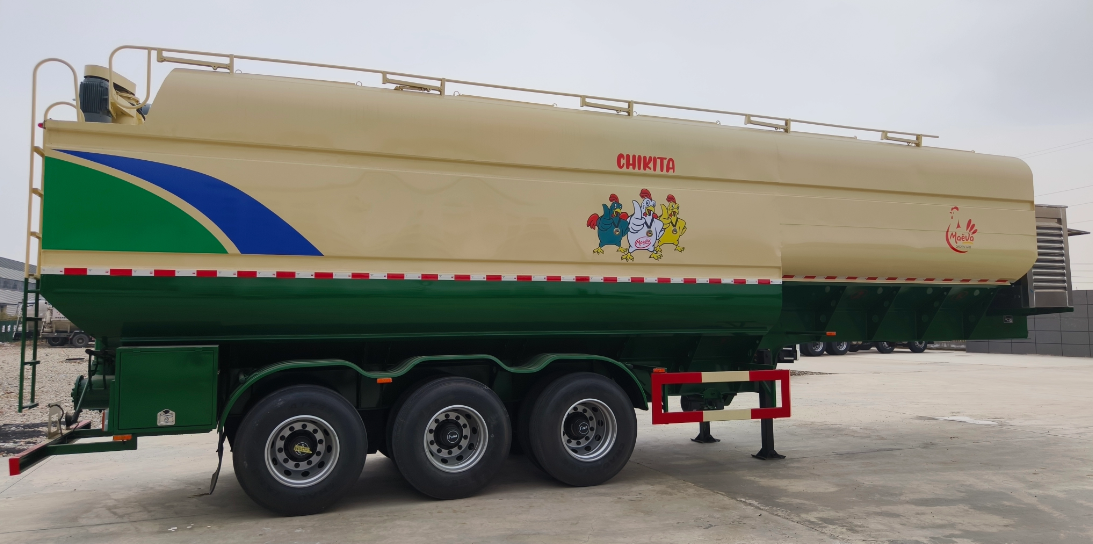In agriculture and livestock, the efficient transportation of feed is essential. Bulk feed trailers have a significant impact on efficiently transferring large amounts of feed to different locations, which ensures that livestock are fed sufficiently and operations are conducted smoothly. This guidance is specifically intended for farmers, feed providers, and livestock owners. It will give you insight into how to choose the appropriate bulk feed trailer and provide you with tips on how to effectively utilize it in your specific agricultural endeavor. These trailers are equipped with preventative measures to prevent the contamination of feed and ensure its distribution is efficient.
1. Understand your specific transport needs is the first step in choosing the appropriate bulk feed trailer.
- The quantity of feed needed to transport is estimated. This will determine the trailer's capacity.
- Distance and Terrain: Consider the distances you need to travel and the type of terrain (paved roads, gravel, off-road) to ensure the trailer is built to handle these conditions.
- Type of Feed: Identify the types of feed you will be transporting as different feeds may require specific trailer features (e.g., pelleted feed vs. loose grain).
2. Research and Compare Different Trailers
- Once you understand your needs, research the various models of bulk feed trailers available.
- Capacity and Size: Larger operations may require higher-capacity trailers, while smaller farms might need more compact, maneuverable trailers.
- Construction Material: Look for trailers made from durable materials like carbon steel or aluminum that resist corrosion and wear.
- Design and Features: Compare features like compartmentalization (for transporting different types of feed simultaneously), augers, and hydraulic systems.
3. Evaluate Key Features and Specifications
- Key features can greatly enhance the efficiency and usability of your bulk feed trailer.
- Augers and Distribution Systems: Check if the trailer is equipped with efficient augers or pneumatic systems for easy unloading.
- Sealing and Hygiene: Ensure the trailer has airtight seals to prevent feed contamination and spoilage.
- Ease of Maintenance: Look for trailers designed with easy access points for cleaning and maintenance.
4. Consider Safety and Compliance
- Safety and regulatory compliance are essential factors when choosing a bulk feed trailer.
- Weight Limits: Verify the trailer meets regional weight regulations to avoid fines and ensure safe operation.
- Safety Features: Look for trailers with stability features, proper braking systems, and lighting for safe operation in diverse conditions.
5. Purchase and Prepare for Use
- After selecting the right trailer, prepare it for use with the following steps.
- Inspection: Have the trailer inspected by a professional to ensure it meets all safety and operational standards.
- Maintenance Plan: Develop a maintenance schedule, including regular cleaning, lubrication of moving parts, and inspection for any wear and tear.
- Training: Ensure that operators are trained on the proper use and maintenance of the new trailer.
6. Regular Maintenance and Upkeep
- Regular maintenance is crucial to ensure the trailer remains in good working condition.
- Routine Inspections: Conduct regular inspections of the trailer's structure, axles, tires, and auger systems.
- Cleaning and Sanitation: Clean the trailer thoroughly between loads to prevent cross-contamination and maintain the quality of the feed.
- Service Schedule: Follow a service schedule for lubricating and checking all mechanical parts to prevent breakdowns.
Tips and Reminders
- Maintain Proper Documentation: Keep records of inspections, maintenance, and repairs for compliance and operational efficiency.
- Eco-Friendly Practices: Consider trailers designed for fuel efficiency and reduced environmental impact.
- Backup Plan: Always have a contingency plan for feed transportation in case of trailer breakdowns or emergencies.
Conclusion
Selecting the appropriate bulk feed trailer is crucial to having efficient transportation of feed and maintaining a smooth farm operation. By understanding your specific transportation requirements, studying the available trailers, evaluating the key features, making sure they're safe and effective, and following regular maintenance, you can guarantee that your feed will reach its destination in a safe and effective manner.
Hubei Kangmu Special Vehicle Equipment Co., Ltd. recommends the following bulk feed trailers for you!
11.8 Meter Bulk Feed Trailer with Auger Conveyor And Self Generating Power Supply

3 Axles Diesel Generator Drives Bulk Feed Truck Trailer for Poultry Feed




















